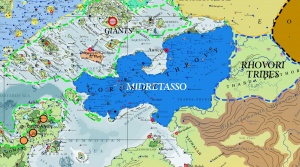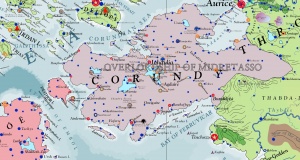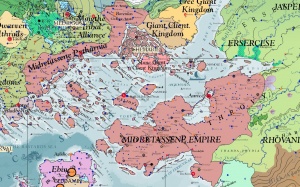Difference between revisions of "Midretassene Empire"
Trismegistus (talk | contribs) |
Trismegistus (talk | contribs) m (→Necromancy) |
||
| Line 12: | Line 12: | ||
=Necromancy= | =Necromancy= | ||
{{Main|Midretassene Necromancy}} | {{Main|Midretassene Necromancy}} | ||
| − | Midretassene necromantic practices did not originate from ancient [[Gwenyan]] customs, but were borrowed from [[Pytharnia]], either from the [[Moigthe]] or the [[Tuadbe]] and scholars generally believe that the ancient [[Neptultchi]] were the earliest source. | + | Midretassene necromantic practices did not originate from ancient [[Gwenyan]] customs, but were borrowed from [[Pytharnia]], either from the [[Moigthe]] or the [[Tuadbe]] and scholars generally believe that the ancient [[Neptultchi]] were the earliest source. Unlike the Yophentheans whose Arathracian religion was thoroughly intolerant of necromancy, Midretassene authorities often looked the other way or even enlisted the aid of necromancers in their wars of conquest. Midretassene necromancy achieved a high degree of professional excellence. |
| + | |||
| + | =Progression of Empire= | ||
[[File:MapMidretasso1stcentury.jpg|thumb|300px|First Century Midretasso was spread through Throvy and Corundy.]] | [[File:MapMidretasso1stcentury.jpg|thumb|300px|First Century Midretasso was spread through Throvy and Corundy.]] | ||
Revision as of 12:38, 17 December 2018
The Midretasssene Empire developed from the Kingdom of Midretasso and remained essentially a monarchy through the imperial period, lasting through the first half of the first millennium after Salmakhamer until it was conquered by the Yophenthean Empire in the sixth century AI. Midretassene heritage remains strongest in the Tassan Plateau of eastern Corundy. Midretasso borrowed and retransmitted components of late Kalaman Civilization throughout its empire. Midretasso was known for its dark religious superstitions, strong military organization, necromancers, gladiatorial combats, and pretense of the rule of law.
Government
The classical structure of the Midretassene Empire was a hereditary ruler, the over-king with nearly absolute military power and limited civil powers. Civil power was held in the Curia under the direction of an elected Meddix whose function was similar to a prime minister or speaker. Outside of Corundy and Throvy, civil authority was limited and directly subject to the military governor appointed by the over-king.
Midretassene Religion
Midretassene Gods are cultural adaptations of the Isxinthion Gods, like most Gwenyan Cultures, with additional divinities from the steppes and ancient Kalama.
Necromancy
Midretassene necromantic practices did not originate from ancient Gwenyan customs, but were borrowed from Pytharnia, either from the Moigthe or the Tuadbe and scholars generally believe that the ancient Neptultchi were the earliest source. Unlike the Yophentheans whose Arathracian religion was thoroughly intolerant of necromancy, Midretassene authorities often looked the other way or even enlisted the aid of necromancers in their wars of conquest. Midretassene necromancy achieved a high degree of professional excellence.
Progression of Empire
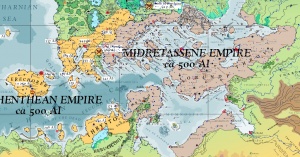
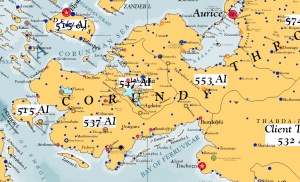
Chronology of Midretasso
- 800 AS
- 8th century AS Midringir tribes immigrate into the Kalaman Peninsula
- 700 AS
- 600 AS
- 500 AS
- 400 AS
- 300 AS
- 200 AS
- 2nd century AS Midringir Flampesha conflicts with Cetibrymio
- 100 AS
- 1st century AS, Cetibrymio becomes capital of united peninsula, becomes the core of the future Midretassene Empire
- 1 AI
- 53 AI, establishment of the Over-King of Midretasso
- 200 AI
- 287 Battle of Deliopian Strait, Midretasso conquers Deliops and the Ithatian isles
- 300 AI
- 327 Midretassene Conquest of Eastern Dúrandwor
- 397 Midretassene Conquest of Western Dúrandwor
- 400 AI
- 415 Battle of Curchása, Midretasso ensures its prolonged rule of Dúrandwor.
- 469 Battle of Danallo, Yophenthean defeat of Moigthe power in southwestern Pytharnia as part of the ongoing struggle between Yophenthea and Midretasso for control of Pytharnia.
- 492 AI to 513 AI Zelukian War Yophenthea wars against Midretasso and her allies
- 500 AI
- 513 Battle of Siul
- 515 Yophenthean Conquest of Deliops and Desthor
- 537 Yophenthean Conquest of western Corundy
- 547 Yophenthean Conquest of the Vimalian Plateau
- 552 Yophenthean Conquest of Dúrandwor
- 553 Yophenthean Conquest of Tassan Plateau (eastern Corundy) and southwestern Throvy
See Also
- List of the Over-Kings of Midretasso
- Midretassene Language
- Midretasso
- Midringir Tribes
- Necromancy in Ancient Midretasso
| This article is a stub. It requires further development by the creator. |
